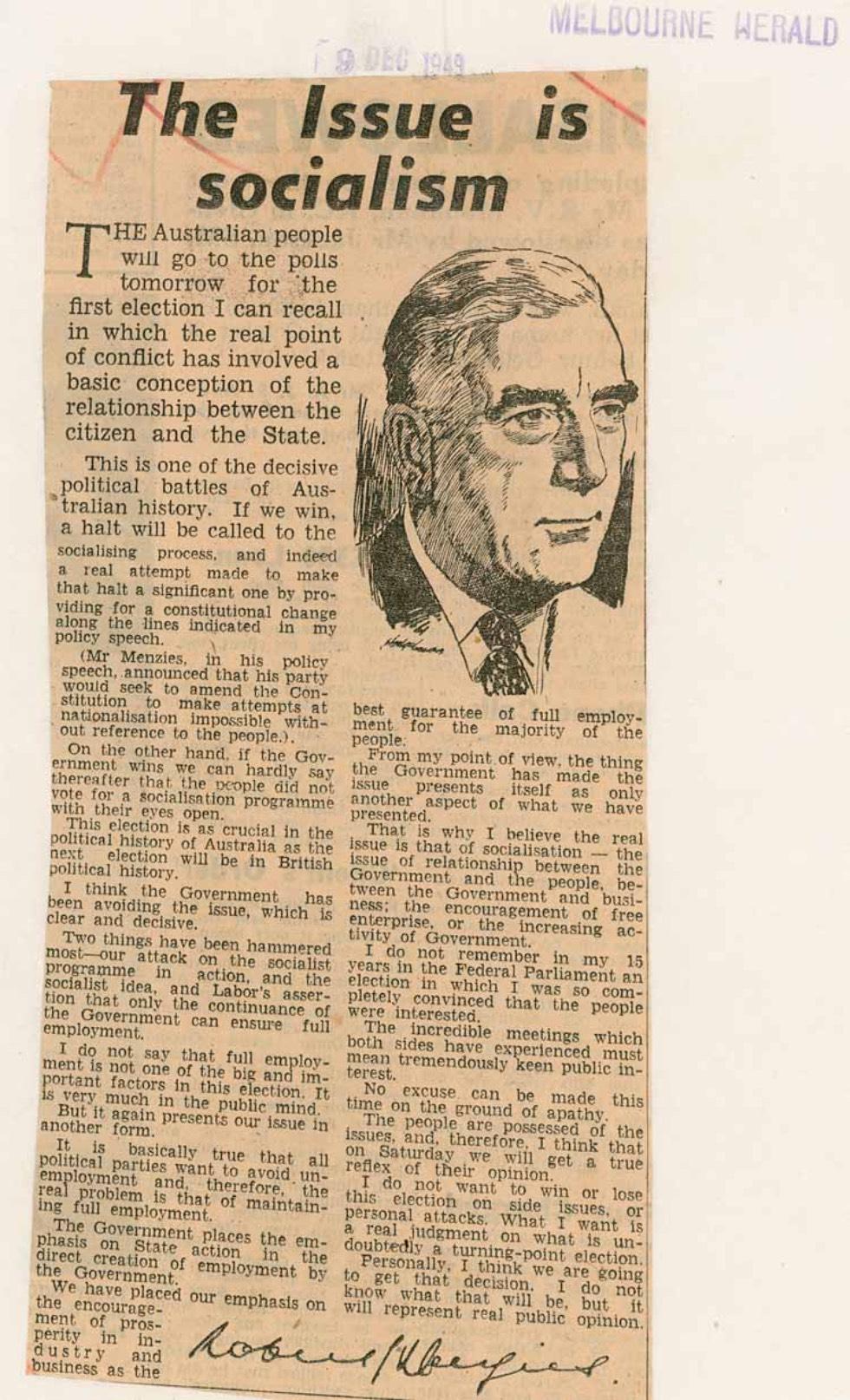
Newspaper article from the Melbourne Herald.
Aboriginal and Torres Strait Islander people should be aware that the National Archives' website and collection contain the names, images and voices of people who have died.
Some records include terms and views that are not appropriate today. They reflect the period in which they were created and are not the views of the National Archives.


Newspaper article from the Melbourne Herald.
[A clipping from a newspaper, which has been glued to a piece of paper and stamped:] MELBOURNE HERALD 9 DEC 1949
[Heading:] The Issue is socialism
[The article is illustrated with a black and white sketched portrait of Robert Menzies.]
The Australian people will go to the polls tomorrow for the first election I can recall in which the real point of conflict has involved a basic conception of the relationship between the citizen and the State.
This is one of the decisive political battles of Australian history. If we win, a halt will be called to the socialising process, and indeed a real attempt made to make that halt a significant one by providing for a constitutional change along the lines indicated in my policy speech.
(Mr Menzies, in his policy speech, announced that his party would seek to amend the Constitution to make attempts at nationalisation impossible without reference to the people.).
On the other hand, if the Government wins, we can hardly say thereafter that the people did not vote for a socialisation programme with their eyes open.
This election is as crucial in the political history of Australia as the next election will be in British political history.
I think the Government has been avoiding the issue, which is clear and decisive.
Two things have been hammered most – our attack on the socialist programme in action, and the socialist idea, and Labor's assertion that only the continuance of the Government can ensure full employment.
I do not say that full employment is not one of the big and important factors in this election. It is very much in the public mind.
But it again presents our issue in another form.
It is basically true that all political parties want to avoid unemployment and, therefore, the real problem is that of maintaining full employment.
The Government places the emphasis on State action in the direct creation of employment by the Government.
We have placed our emphasis on the encouragement of prosperity in industry and business as the best guarantee of full employment for the majority of the people.
From my point of view, the thing the Government has made the issue presents itself as only another aspect of what we have presented.
That is why I believe the real issue is that of socialisation – the issue of relationship between the Government and the people, between the Government and business; the encouragement of free enterprise, or the increasing activity of Government.
I do not remember in my 15 years in the Federal Parliament an election in which I was so completely convinced that the people were interested.
The incredible meetings which both sides have experienced must mean tremendously keen public interest.
No excuse can be made this time on the ground of apathy.
The people are possessed of the issues, and, therefore, I think that on Saturday we will get a true reflex of their opinion.
I do not want to win or lose this election on side issues, or personal attacks. What I want is a real judgement on what is undoubtedly a turning-point election.
Personally, I think we are going to get that decision. I do not know what that will be, but it will represent real public opinion.
[Printed signature:] Robert Menzies
This newspaper article headed 'The Issue is socialism' was written as an election-eve statement by the leader of the Liberal opposition, Robert Gordon 'Bob' Menzies, and was published by the Melbourne Herald newspaper on 9 December 1949. It is accompanied by a line drawing of Menzies's head showing a three-quarter profile, and contains his signature at the bottom.
Learning resource text © Education Services Australia Limited and the National Archives of Australia 2010.
Learn how to interpret primary sources, use our collection and more.
